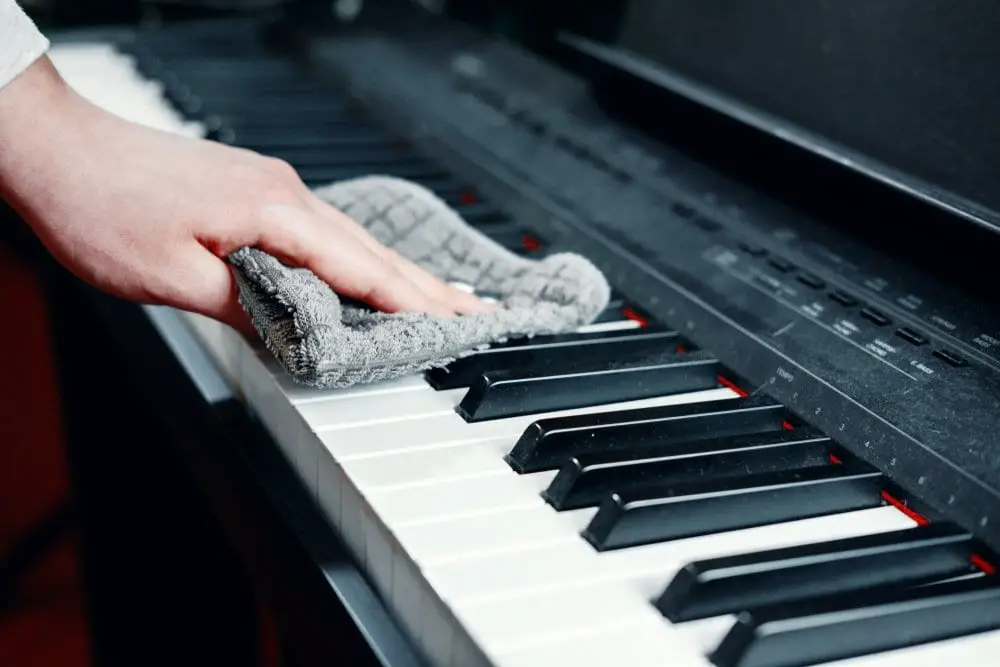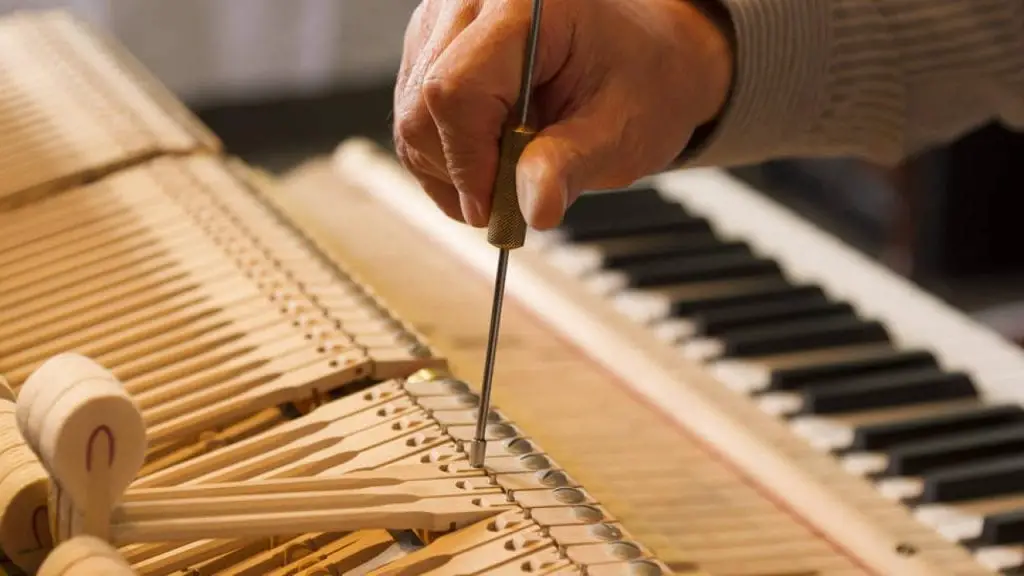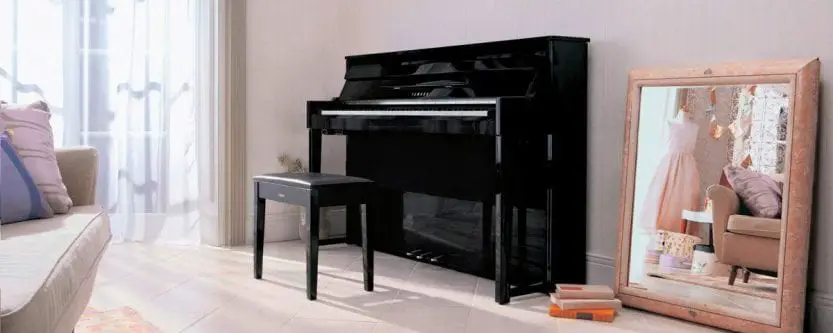Learning how to play a piano is a great achievement. Mastering the craft is a great challenge. Playing the piano brings about a lot of benefits. It improves mental health, gets rid of stress, reduces the risk of anxiety and depression. Sitting in front of the piano and playing for a few minutes can keep you feel positive, improve self-esteem, and can make you feel positive.
But the challenge of playing the piano does not end in learning alone. Having a piano itself is a big challenge. How do you keep it in good condition is one big challenge that you need to learn as it is your role to keep your instrument in good condition keep it clean at all times.
It is a great privilege to have your own piano. Pianos are expensive. That is the reason why proper care should be given to it. Also, the fact that dirty piano can affect the quality of its tone. For some, they would require professionals to keep their pianos clean and in shape. But regular maintenance and dusting can be very helpful to keep your pianos clean, and you can do it so that you won’t require professional cleaners too often.
If you are playing the piano, you know that it is very important to keep in good shape. Regular maintenance may help and keep it in good shape. You can actually do some small cleaning. Dust and dirt can collect on your piano as well as oil from your skin. Even if you wash your hand before playing the piano, the skin may still pick up some grime that can be transferred on your piano?
Is it possible to clean the piano without calling professional cleaners?

The answer is YES. This is a simple task that needs just the right equipment. Cleaning can be fairly easy without the help of cleaning professionals.
Investing in a piano is not an easy matter. Sure, you love to play, but there is more than just playing in having a piano. The fact that pianos can be costly, it also needs some tuning and cleaning to keep it in good shape. To keep your piano in good condition and last for years and keep it in good running condition, make sure that you keep it in tune and clean at all times.
A piano-like any other valuable things or equipment requires appropriate cleaning.
- Know what kind of keys do you have – Pianos are made of different materials; thus, it is important to know which type of materials your piano is made of—knowing which material your piano is made of will allow you to choose the right cleaning material for it. There is a big difference in how you will be cleaning ivory keys compared to plastic ones. Ivory keys are heavier than plastic ones.
Here are some tips on how to distinguished and ivory key versus a plastic one.
- Ivory keys are off white in color while plastic keys are distinctly white.
- The plastic keys are smooth and very clear. They have clear-coatings.
- Ivory keys have two parts joined together, which are visible to the eyes.
- Ivory keys can look yellowish
- Clean the keys – Knowing what type of keys you have, you may now start cleaning them. Dust off the keys before cleaning them thoroughly. You may dust them in between by the use of a soft-bristled brush or plain brush or a duster. Make sure to dust them up and down.
- Disinfect your piano keys – If you want to disinfect your piano, you may use filtered water mixed with white vinegar to wipe them up and down. You can use a flannel or a cheesecloth you may wipe it vertically. After that, you may take your time to wipe the keys to dry them. The warm water mixed with white vinegar solution is perfect for plastic keys or anything that is plastic. Just make sure not to put too much vinegar on the water as the acid can be harmful too. The good proportion is one-part vinegar to four parts water.
- Use a mild solution of warm water in cleaning ivory keys – This is sufficient enough to effectively clean ivory keys. Apply the solution up and down on the keys. Do not forget to dry them using flannel or cheesecloth. Toothpaste is also a good medium in cleaning ivory keys. Just make sure that it is a regular toothpaste. Colored toothpaste or gels may cause corrode and discolor the keys. The toothpaste will l whiten the ivory keys that might have turned yellow over time. You may also transfer your piano to a place with indirect sunlight as it will help bleach the keys and make them look whiter again. You can also use a white vinyl eraser and just gently rub it down each of the white keys.
- Cleaning the plastic keys – It is easy to clean plastic keys as they are synthetic, unlike ivory. They are flat and smooth, and they do not have warp marks or grain. Here are the steps to clean the plastic keys:
- Prepare a cloth damp with water and drops of liquid detergent or liquid dish detergent or vinegar. Mix the solution then dip it in a microfiber cloth or flannel.
- Carefully wring out the excess water and rub it gently to the keys using up and down motion.
- Again, take the cloth, damp it in the mixed solution and run it again to other keys using the same motion. Repeat the same process until you are able to clean all the keys.
- Finally, go over the keys with a dry clean cloth to dry them. Make sure that the keys are clean and dry.
- Clean the Soundboard and the casework – use a clean damp cloth. Gently rub it on the outside the piano. Start working in small sections and then dry those small sections with a clean cloth. In cleaning the sections, use straight strikes following the direction of the wood grain. Do not clean it in a circular motion as it may cause swirls and streaks. Make sure to use a non-abrasive cloth like microfiber or cotton. They are effective in removing smudges, dirt, and fingerprints. The cloth should be just slightly damp as very damp cloth may leave visible moisture.
- Polishing the soundboard and casework – if polishing is required, just apply a small amount of piano polish directly to a soft cloth. Rub a section of the piano following the direction of the grain. Take extra attention with the corners and the edges. Wipe away excess polish using a clean cloth. There are things that must be considered in polishing.
- Use a polish that is safe for pianos.
- Polish only if the piano really needs a thorough cleaning
- Avoid using high-gloss polish instead use gloss polishes on polymer finishes
- Do not regular household furniture polish, and avoid products with lemon oil and also do not spray aerosol.
- Clean soundboard from dust – you can just blow away dust from accumulated dust on the soundboard. You may also use a vacuum. However, this can be risky as it can damage the strings and dampers. If you think you can handle it, here’s what you need to do.
- Use a vacuum or a compressed air nozzle a few inches from the surface of the soundboard.
- Use vertical strokes in the direction of the strings to blow the dust.
- Make sure not to touch the string or the dampers.
- Blow the dirt and the dust to an accessible corner of the piano.
- Keep the Piano clean – it is very important to keep the piano clean to avoid the accumulation of dust and dirt. Make sure that your hands are properly before you play the piano. Lather your hands and wash it with soap and rinse it with water, then pat dry them with a clean cloth or towel.
- Keep the piano away from things that can harm it. Extreme hot and cold temperatures, sun, humidity can damage the piano. Keep the piano out of sunlight and keep it in a room that you can control the temperature. Keep it piano in a room where air circulation is good. Do not store it in a room that is prone to dampness or do not place it near any vents or drafts.
- Put protection if you need to place something on the piano – If you have to place an object on top of your piano, do not place them directly. Make sure to put a protective felt on the base that will not scratch the surface of the piano. Avoid placing any food, drinks, or any liquid products, vinyl or rubber. They might cause some stain or scratches on the piano.
- Never spray any products directly to the piano. If you need to polish the piano, do not spray it directly to the piano; instead, spray it directly to the cloth. If you are going to spray it to the cloth, make sure that you are at least 3 feet away from the piano so that the particles will not land on the strings, keys, or other delicate parts of the piano.
- Close the lid when you are not using the piano – By closing the lid of the piano, you are protecting the piano from any dirt and dust.
Investing in a piano is not an easy matter. Sure, you love to play, but there is more than just playing in having a piano. The fact that pianos can be costly, it also needs some tuning and cleaning to keep it in good shape. To keep your piano in good condition and last for years and keep it in good running condition, make sure that you keep it in tune and clean at all times.
A piano-like any other valuable things or equipment requires appropriate cleaning.
Piano Tuning

Aside from keeping your piano clean, it is also very important to keep your piano in tune. Wen we say tuning the piano, it means that you have to keep the right pitch of each tone. It is possible by tightening the strings. Tuning the piano is usually done by experts.
A piano has 220 strings, and each string has a different frequency and pitch. As we use the piano, the string can get loose, and later, you will notice that the sound becomes out of tune. Remember that the stings are the ones responsible for the sound of the piano; thus, caring for them is very important. Tuning is essential. No matter how great of a pianist you are, if your piano is playing off keys, then you are not creating a piece of good music at all. Pianos are easy to tune if they are taken care of and tuned in regularly. Note also the regular tuning can also prevent damage that can occur when someone is playing with an overstretched string. Pianos who have not been tuned for a while may have some damage, and it may cost some money to get it back in good shape.
Being a pianist is not all about being able to play a good song and bring out a perfect melody. The music is not just produced by the pianist alone. It is between the pianist and the piano. No matter how good you are, if the instrument is not playing well, you cannot produce good music. That is why a musician should be responsible for taking care of his or her instrument. For a pianist, it is important to keep your instrument, especially that a piano is a costly investment. A little dusting and cleaning every day will not consume much of your time. Taking care of your piano will save you a lot of money, especially damage that has been done on the equipment. Taking care of your piano is preserving the beauty in it and letting it to continuously produce a beautiful sound as your expert fingers play the harmony of the music. Keep it clean. Keep it in good shape. Keep playing.



